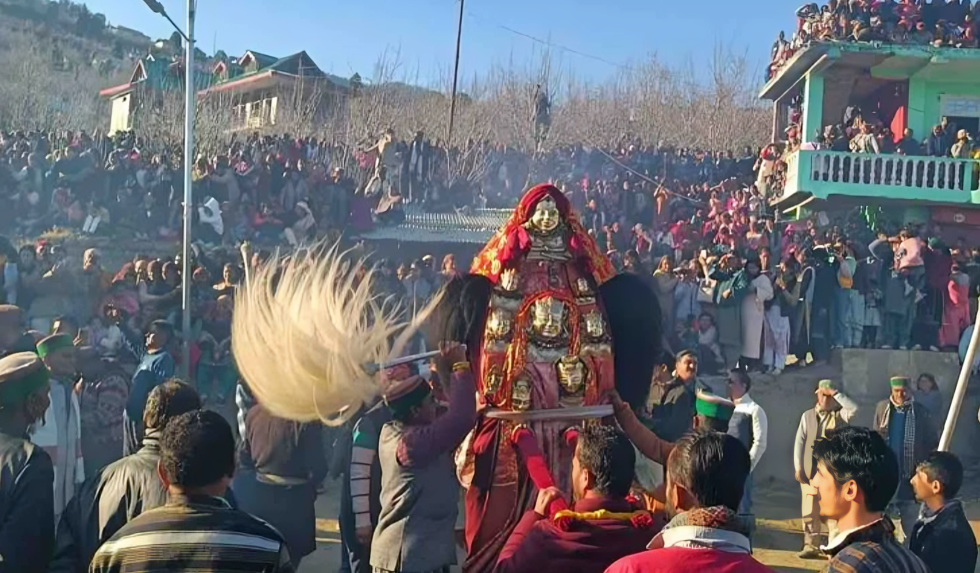Bhunda Festival is one of the oldest and most revered festivals in Himachal Pradesh, observed mainly in Nirmand and Rohru. It is a big ritual done every few decades, so it is an event of a lifetime for the majority of people. The festival has deep mythological roots and is supposed to bring divine blessings, ensuring the well-being and security of the people.
Historical Background of Bhunda Festival
The Bhunda Festival traces its history back to the very early ages with strong references to Hindu mythology. It is supposed to have associations with the mythology of Lord Parshuram, who was the sixth avatar of Lord Vishnu. In folklore, it is mentioned that Parshuram asked a yajna (ritual sacrifice) to be done in order to placate the gods and eradicate bad energies from the area. It has been performed for generations and hence remains one of the most ancient rituals in Indian culture.
Bhunda Festival in Nirmand & Rohru: Regional Importance
Both Nirmand and Rohru of Himachal Pradesh are popular for celebrating this grand festival. While Nirmand, also called the ‘Himalayan Kashi,’ is famous for being religiously important, Rohru also plays its part in bringing this unusual culture to life. The festival also draws thousands of pilgrims, locals, as well as travelers who are privy to view the grand ceremony and rituals.
Rituals and Traditions of Bhunda Festival
The Bhunda Festival is filled with a collection of special rituals, the highlight of which includes:
- The Grand Rope-Pulling Ceremony: A huge rope, made of sacred grass, is pulled by the devotees in a symbolic gesture of weighing good and evil.
- Yajna (Fire Ritual): A fire ritual is performed to seek the blessings of gods.
- Animal Sacrifice (Now Reduced): In the past, animal sacrifices were offered, but more recently, other symbolic rituals have taken the place of this activity.
- Community Feasts: Devotees prepare and serve traditional food, creating a strong sense of community.
Also Read: Mandi Shivratri: Rituals, Traditions, and the Iconic Mandi Shivratri Fair
Spiritual and Cultural Significance
The Bhunda Festival is not only a religious festival—it is a social and cultural festival that unites people. It is said that attending the festival is auspicious, cleanses the soul, and eliminates impediments in life. It is a responsibility for many locals to give back so that the tradition can be passed on to generations to come.
The Once-in-a-Generation Celebration
One of the most interesting things about the Bhunda Festival is that it is only celebrated once every 12 to 20 years. In contrast to yearly festivals, this long interval makes it a much-awaited event. Families prepare for years, and individuals from all across Himachal Pradesh come back to their hometowns to participate in the festivities.
Impact of Bhunda Festival on Local Society
The festival has a great effect on the local economy and tourism.
- Boosts Tourism: Tourists numbering in thousands arrive to attend the festival, boosting the hotels, transport, and local businesses.
- Promotes Cultural Heritage: Facilitates the preservation of local customs and traditions for future generations.
- Strengthens Community Ties: Inspires individuals to cooperate, creating unity and a sense of shared responsibility.
Preservation of the Bhunda Tradition
With modernization, a lot of old customs are in danger of being lost. Nevertheless, there are attempts to conserve the Bhunda Festival:
- Local communities are recording its history.
- It is continued by government and cultural organizations.
- Symbolic rites are supplanting old rituals to keep up with contemporary values.
Conclusion
The Bhunda Festival is a reflection of the state’s rich cultural and spiritual heritage. Organized only once in decades, it is still a symbol of strong faith, devotion, and oneness. As a devotee or culture lover, you must see the Bhunda Festival at least once in your lifetime.
FAQ’s
When is the next Bhunda Festival expected to be held?
The festival is celebrated about every 12 to 20 years, so the date is not fixed. The locals and temple committees determine it based on astrological and traditional factors.
What is the main attraction of the Bhunda Festival?
The rope-pulling ceremony and yajna are the most important rituals, and they attract huge crowds.
Is the Bhunda Festival open to tourists?
Yes, tourists are free to attend the festival, but they should be mindful of local traditions and customs.
Why is the Bhunda Festival celebrated only once in decades?
It is said that the divine power evoked during the festival remains effective for many years, so frequent celebrations are not required.








